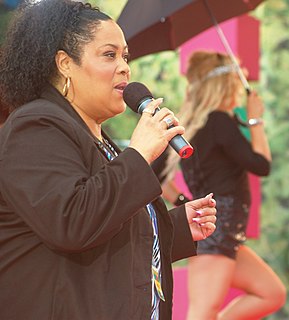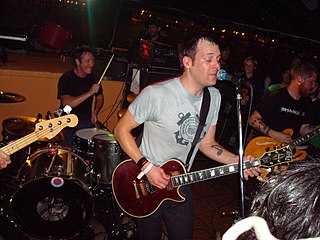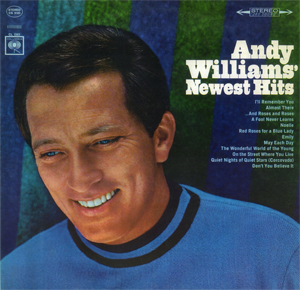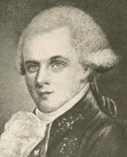"Moon River" is a song composed by Henry Mancini with lyrics by Johnny Mercer. It was originally performed by Audrey Hepburn in the 1961 movie Breakfast at Tiffany's, winning an Academy Award for Best Original Song. The song also won the 1962 Grammy Awards for Record of the Year and Song of the Year.

C+C Music Factory was an American musical group formed in 1989 by David Cole and Robert Clivillés. The group is best known for their five hit singles: "Gonna Make You Sweat ", "Here We Go ", "Things That Make You Go Hmmmm...", "Just a Touch of Love", and "Keep It Comin'". The band stopped recording in 1996, following Cole's death. In 2010, C+C Music Factory reformed, with Eric Kupper replacing Cole. Original vocalist Freedom Williams acquired trademark rights to the name in 2003 and still tours under that moniker.
"Days of Wine and Roses" is a popular song, from the 1962 movie of the same name.
"Cold, Cold Heart" is a country music and pop song recorded by Hank Williams. This blues ballad is both a classic of honky-tonk and an entry in the Great American Songbook.
"Mule Train" is a popular song written by Johnny Lange, Hy Heath, Ramblin' Tommy Scott and Fred Glickman. It is a cowboy song, with the singer filling the role of an Old West wagon driver, spurring on his team of mules pulling a delivery wagon. As he goes about his work, the driver mentions the various mail-order goods he is delivering to far-flung customers. "Mule Train" was originally recorded by Ellis "Buz" Butler, Jr in 1947. Butler was the original writer of the song along with Fred Glickman. The original recording was released by Buz Butler on Decca Records.

American Steel is an American punk rock band formed in 1995 in Oakland, California. When offered their first show, the group took their name from the block-long sign on the warehouse across the street. After playing at parties and smaller venues around the Bay Area for over a year, and undergoing several lineup changes, the band bought a van and embarked on their first tour of the US, lasting 32 days and covering 12,000 miles.
"Who Can I Turn To?" is a song written by English lyricists Leslie Bricusse and Anthony Newley and first published in 1964.

Andy Williams' Greatest Hits is a compilation album by American pop singer Andy Williams that was released in early 1970 by Columbia Records. It was not, however, as its title might suggest, strictly a hit singles compilation, although some of his biggest songs since joining Columbia were included. A couple of selections were never released as singles by Williams, and his signature song, "Moon River", was released in the 7-inch single format but only for jukeboxes. His six Cadence singles that made the Top 10 on Billboard magazine's Hot 100 are passed over for the inclusion of his number 11 hit from that label, "The Hawaiian Wedding Song", and 17 of his Columbia recordings that made the Hot 100 up until 1970 are left out here in favor of "Charade", which spent its one week on the chart at number 100.

Moon River: The Very Best of Andy Williams is a compilation album by American pop singer Andy Williams that was released on October 13, 2009. A note from Williams inside the CD booklet explains that the album "was put together to coincide with my memoir Moon River and Me, published by Viking/Penguin. It includes many of the songs that you made hits. I truly appreciate that, and I hope you enjoy the songs we selected for this CD." The collection covers a wide assortment of his material, including crossover hits, stabs at the youth market, a pair of Mancini-Mercer Oscar winners, a Christmas classic, and a eulogy to Robert F. Kennedy.

Moon River and Other Great Movie Themes is the ninth studio album by American pop singer Andy Williams and was released on March 26, 1962 by Columbia Records and covered film songs that were mostly from the previous decade.

The Shadow of Your Smile is the eighteenth studio album by American pop singer Andy Williams and was released in April 1966 by Columbia Records and included covers of "Michelle" and "Yesterday", the same pair of Beatles ballads that labelmate Johnny Mathis recorded for his 1966 album of the same name. For Williams these selections initiated a trend away from the traditional pop formula that his album output at Columbia up until this point had adhered to.

Honey is the twenty-second studio album by American pop singer Andy Williams, released in the spring of 1968 by Columbia Records. In reviewing the LP William Ruhlmann of Allmusic traced the progression of the Williams formula, noting that "he had been drawing on the recent hit parade for some of his material for years. But Honey marked his complete crossover to such an approach. Where earlier Williams albums had been a canny mix of movie songs, standards, pop hits, and foreign -- especially French -- material, ten of Honey's 11 tracks were songs that had been Top 40 hits in the last two years."

Happy Heart is the twenty-third studio album by American pop singer Andy Williams, released in the spring of 1969 by Columbia Records and continued the trend of his recent albums in relying exclusively on contemporary material. This particular project eschewed offerings from Broadway and Hollywood that had been predominant on his LPs with Columbia.

Calling All Hearts is the fourth studio album by American R&B singer Keyshia Cole, released on December 21, 2010 in the United States by Geffen Records. Appearances on the album include Nicki Minaj, Tank, Faith Evans, Timbaland and Yvonne Cole.

Andy Williams' Newest Hits is a compilation album by American pop singer Andy Williams that was released early in 1966 by Columbia Records and was the first LP to compile the singer's Columbia material. Seven of the 12 tracks had reached the charts in Billboard magazine, and another had been released as a single in the UK. Three album cuts were also included along with a recent B-side.

The Very Best of Andy Williams is a compilation album by American pop singer Andy Williams that was released in the UK on October 5th, 2009. A note from Williams inside the CD booklet explains that the album "was put together to coincide with my memoir Moon River and Me, published by Orion Press. It includes many of the songs that you made hits. I truly appreciate that, and I hope you enjoy the songs we selected for this CD." This compilation includes recordings that either charted in the UK but not in the US or charted much higher on the UK singles chart than they did on the Billboard Hot 100 in the US. It entered the UK albums chart on October 17, 2009, and reached number 10 during its six weeks there.
"Emily" is a popular song composed by Johnny Mandel, with lyrics by Johnny Mercer. It was the title song to the 1964 film The Americanization of Emily. It has since been recorded by numerous artists, notably Bill Evans and Tony Bennett.











